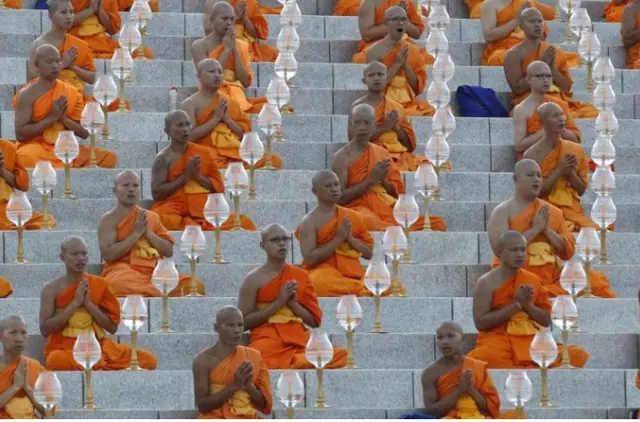Thai people frequently go to Buddhist temples to seek spiritual healing and hold ceremonial events.
The sentiment is stronger in Thailand’s local areas, where temples have become a central facility for communities.
Some Thai people even believe that they would be able to go to heaven if they do good deeds based on Buddhist doctrine.
Monks, who stand by and guide people in such endeavours, are often considered representatives of Buddha and expected to behave appropriately in all aspects of their lives.
However, recent news reports in Thailand have shown that it is not rare for monks to misbehave, with some found to have used illegal drugs inside temples and others flirting with women.
In one case, nine monks, including a long-revered head priest, were recently arrested in a village in the northeastern province of Amnat Charoen for allegedly using drugs at a temple along with local teenagers.
“I still cannot believe this story is true,” one villager said. “The head monk has always been nice and merciful. I think the police and military are defaming him.”
Despite the incident, villagers said they will continue to visit temples and make merit.
Narong Chuebuayen, a doctoral candidate who used to be a monk for 16 years, said Buddhist priests generally come from poor families and some lack education.
They include people who had been unemployed or those who have just completed their time in jail.
People with such background may find life as a monk to be tough, particularly because it was not their desire to become a priest in the first place, Narong said.
“The monk society itself is very stressful because there are more than 200 regulations to follow, which is very difficult for normal people,” he said.
“Some people may expect monkhood life to be more peaceful, but actually it is not. If they are not mentally strong enough, they can easily become nervous and rely on drugs and other vices, which are very easy to do inside the temple because no one would check,” he added.
Narong said monks who do drugs most probably had been drug users from before or have friends that do so. Asked if he knows about monks who flirt with women, he said this happens “very often” with young monks.
Narong also pointed out that the line between Buddhist temples and the outside world has been disappearing amid globalisation nowadays, with monks enjoying the luxury of smartphones, televisions and cars.
Not all Thai Buddhist monks engage in bad behaviour, however. Maitree Boonmart, a police investigator, told Kyodo News that while the issue of monks using drugs is not something new in Thai society, it is only a small handful of them that actually misbehave.
And for the police, it is not easy to detect when monks do something wrong because they are so highly regarded that people commonly would not think about suspecting them of misconduct and reporting to authorities, Maitree said.
“I would say it is quite difficult when it comes to monks as we normally don’t monitor them,” he said. “When police get reports, we need to gather evidence and be very careful if we must raid a temple because it is a very sensitive issue.”
How fortune-telling and politics intertwine in Thailand
Thailand’s National Office of Buddhism oversees the behaviour of monks nationwide in terms of law enforcement, but the entity cannot effectively control the behaviour of each individual priest, according to Chayapol Pongsida, deputy director of the office.
Chayapol told Kyodo News that Buddhism is a religion of mercy which welcomes all those who wish to pursue its doctrine and become good people.
He also noted that there is no effective process of screening who can become monks in Thailand and that each temple is not even aware of the necessary background of each monk at their facility.
“Monks are no different from normal people, but once they wear Buddhism’s yellow robe they need to maintain a standard of high moral and ethical behaviour,” Chayapol said.
“But some monks never intended to be ordained from the beginning, so their sense of being a commoner still exists,” he added.
 简体中文
简体中文

